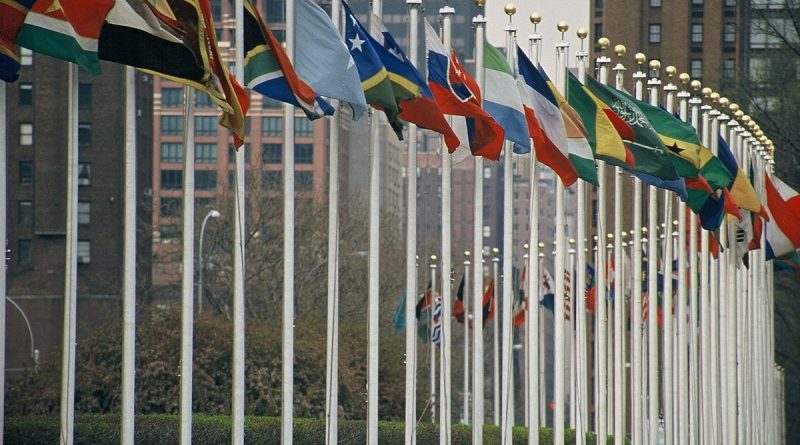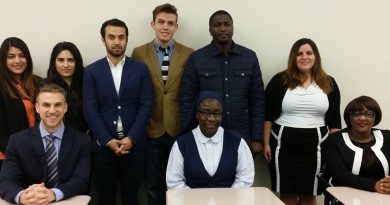Ambassador Csaba Kőrösi Attends SHU World Leaders Forum
Ashley Skladany
Staff Writer
On January 26, Seton Hall University’s School of Diplomacy and International Relations hosted its first World Leaders Forum event of the year, welcoming President of the 77th United Nations General Assembly (UNGA) Ambassador Csaba Kőrösi. The World Leaders Forum serves as a series of public lectures and dialogues for distinguished visitors to share their insights and valuable perspectives on global topics. Ambassador Kőrösi’s visit included a presentation outlining how the world can and should aim for peace, as well as opportunities for small groups of students to ask the Ambassador questions relating to his experience as President of the UNGA.
The forum opened with introductory remarks from Dean of Seton Hall University’s School of Diplomacy and International Relations, Courtney Smith, who outlined the complex and challenging role which Ambassador Kőrösi is tasked to take on as President of the UN. Smith acknowledged that as the leading figure of 193 countries in the United Nations, the ambassador must put aside his own biases and try to balance the interests of nations facing geopolitical divides. Seton Hall University President Joseph Nyre recognized the difficulty of the position, mentioning the Doomsday Clock’s warning of “90 seconds until a global catastrophe” regarding ongoing crises surrounding global affairs. Nyre expressed that Ambassador Kőrösi has a responsibility to inspire progress to alleviate human suffering and address the world’s most pressing issues.
Former UN Hungarian ambassador to the U.S., László Szabó, was introduced as a visiting scholar prior to Ambassador Kőrösi’s speech. He set the stage for the following lecture by sharing Kőrösi’s experiences as a leader for climate action. Prior to assuming his current position, Ambassador Kőrösi had served as the Director of Environmental Sustainability for the former president of Hungary, where he worked with high-profile political figures. This background served as a perfect segue for Kőrösi’s lecture on the critical topic of promoting international peace, where he related much of his lecture to the issues of the global climate.
Ambassador Kőrösi detailed his discussion with alarming statistics to punctuate his message. According to Kőrösi, many nations will be on “death row” due to a rising global surface temperature, and will average 250,000 additional deaths per year by 2030. Displacement, food insecurity, and droughts continue to plague society presently, Kőrösi noted. Despite the urgency of these issues, global governance has weakened, worsening the conditions in which policymakers must address global issues.
Throughout his talk, Ambassador Kőrösi emphasized the crucial role that individuals play on the world stage. The Ambassador spoke of “a great acceleration” that propelled the world towards facing various crises. The Ambassador pointed out that the globe has “never had this many armed conflicts” waged at once since World War II. Regarding the invasion of Ukraine, Ambassador Kőrösi delved into the war’s devastating effects on food accessibility and prices, as well as the global economy’s potential for a worldwide recession. He shared that 76 countries, more than one-third of the world, currently verge on financial collapse. Ambassador Kőrösi also expressed concern towards the disproportionate effects of energy and water crises on vulnerable countries and stressed the importance of alleviating vulnerable nations’ suffering.
Though the ambassador’s discussion began by reminding listeners of global hardships, Ambassador Kőrösi delivered a message of hope, emphasizing that work towards peace is not impossible. He shared promising news surrounding potential breakthroughs in fusion and quantum energy that can offer reliable solutions to ongoing conflicts such as climate change. The ambassador aimed to encourage conversations and reflection, as well as underscore the important role individuals play in creating a sustainable future, especially through scientific discovery. Weighing in on the lecture, Dean Smith shared:
“The President of the General Assembly’s remarks reflected both realism and optimism. Realism is important given the significant array of global challenges that we face, but it must be balanced with optimism about humanity’s capacity to transform current thinking and practice into new opportunities for progress. This is an essential message for all of us to hear, but it is especially important for our students since it will be in the hands of future leaders to continue the work that the ambassador and others have started.”
Kőrösi expressed hope that through shared solidarity and efforts towards sustainability and science, humanity has the power to implement radical change to transform the current course of development. After articulating a clear vision of what is at stake, Ambassador Kőrösi closed his lecture by imploring his audience to join the movement for change and to become an active participant in supporting the scientific and technological advancements that will transform our future.
Image courtesy of Wikimedia Commons


